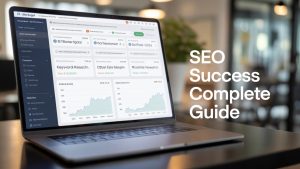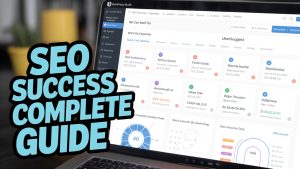
In today’s digital world, having a website is not enough. If your site doesn’t rank on search engines like Google, it’s practically invisible. Search Engine Optimization (SEO) is the key to unlocking organic traffic, boosting visibility, and growing your business online.
However, many businesses fail at SEO because they miss crucial steps. Without the right strategies, your SEO efforts will go to waste. This guide will explain:
-
What SEO is and how it works
-
Why SEO is essential for online success
-
The different types of SEO
-
Which SEO strategies work best for ranking your website
By the end of this post, you’ll understand the must-follow steps to make your SEO effective.
What is SEO?
SEO stands for Search Engine Optimization, a set of techniques used to improve a website’s visibility in search engine results pages (SERPs). The goal is to rank higher for relevant keywords so that more users can find your website organically (without paid ads).
How Does SEO Work?
Search engines like Google use complex algorithms to determine which websites deserve to rank. These algorithms consider factors such as:
-
Relevance – Does your content match what users are searching for?
-
Authority – Does your site have trustworthy backlinks?
-
User Experience – Is your site fast, mobile-friendly, and easy to navigate?
SEO involves optimizing these factors so that search engines favor your website.
Why Can’t You Ignore SEO?
-
93% of online experiences begin with a search engine (BrightEdge).
-
75% of users never scroll past the first page of Google (HubSpot).
-
SEO drives 1,000%+ more traffic than organic social media (BrightEdge).
If you’re not optimizing for search engines, you’re missing out on massive traffic and potential customers.

Why is SEO Important?
1. Increases Organic Traffic
SEO helps your website appear in front of people actively searching for your products or services. Unlike paid ads (which stop working when you stop paying), SEO brings long-term, sustainable traffic.
2. Builds Trust & Credibility
Websites ranking on the first page of Google are perceived as more trustworthy and authoritative. A strong SEO strategy establishes your brand as an industry leader.
3. Cost-Effective Marketing
Paid ads (like Google Ads) can be expensive. SEO, on the other hand, provides free traffic over time, reducing customer acquisition costs.
4. Better User Experience
Google rewards websites that offer a fast, secure, and mobile-friendly experience. SEO forces you to improve these elements, leading to higher engagement and lower bounce rates.
5. Higher Conversion Rates
SEO targets high-intent users—people actively searching for solutions. This means better-quality leads and higher conversion rates compared to other marketing channels.
Without SEO, your competitors will dominate search rankings, leaving your business struggling to get noticed.
Types of SEO
SEO can be broken down into three main categories:
1. On-Page SEO

This refers to optimizations done within your website to improve rankings. Key elements include:
-
Keyword Optimization – Using relevant keywords in titles, headers, and content.
-
High-Quality Content – Creating informative, engaging, and well-structured articles.
-
Internal Linking – Connecting related pages to improve navigation and SEO.
-
Meta Tags & Descriptions – Writing compelling meta titles and descriptions to boost click-through rates (CTR).
-
Image Optimization – Compressing images and using alt text for better accessibility.
Why is On-Page SEO important?
-
Helps search engines understand your content.
-
Improves user engagement and time spent on site.
2. Off-Page SEO
This involves activities outside your website that influence rankings. The most crucial factor is backlinks (links from other websites to yours).
Key Off-Page SEO strategies:
-
Guest Blogging – Writing articles for authoritative sites to earn backlinks.
-
Social Media Marketing – Sharing content to increase visibility and engagement.
-
Influencer Collaborations – Partnering with industry experts to promote your brand.
-
Local SEO (for businesses) – Getting listed on Google My Business and local directories.
Why is Off-Page SEO important?
-
Builds domain authority and trust.
-
Signals to Google that your site is credible.
3. Technical SEO
This focuses on website infrastructure to help search engines crawl and index your site efficiently.
Key Technical SEO factors:
-
Site Speed – A slow website hurts rankings (use tools like Page Speed Insights).
-
Mobile-Friendliness – Google prioritizes mobile-responsive sites.
-
Secure Website (HTTPS) – A must for ranking and user trust.
-
Structured Data (Schema Markup) – Helps search engines understand your content better.
-
Fix Broken Links & Redirects – Improves user experience and crawlability.
Why is Technical SEO important?
-
Ensures search engines can access and index your pages.
-
Enhances user experience, reducing bounce rates.
Which SEO is Best to Rank Your Website?
All three types of SEO (On-Page, Off-Page, and Technical) are crucial. However, the best approach depends on your website’s current state:
1. If Your Website is New
-
Focus on On-Page SEO (content & keywords) first.
-
Build a few high-quality backlinks (Off-Page SEO).
-
Ensure Technical SEO basics (speed, mobile optimization) are in place.
2. If Your Website Gets Traffic But Doesn’t Convert
-
Improve On-Page SEO (better content, CTAs, internal linking).
-
Optimize for user intent (answer search queries effectively).
3. If Your Website is Old but Not Ranking
-
Conduct a Technical SEO audit (fix crawl errors, broken links).
-
Update old content (On-Page SEO).
-
Build more authoritative backlinks (Off-Page SEO).
The Best SEO Strategy?
A balanced approach combining:
✔ On-Page SEO (for content relevance)
✔ Off-Page SEO (for authority)
✔ Technical SEO (for crawlability & UX)
Skipping any of these will limit your SEO success.
Final Thoughts
SEO is not a one-time task—it’s an ongoing process. Without proper keyword research, high-quality content, backlinks, and technical optimizations, your website will struggle to rank.
Key Takeaways:
✅ SEO is essential for online visibility and organic growth.
✅ On-Page, Off-Page, and Technical SEO must work together.
✅ A well-optimized website ranks higher, gets more traffic, and converts better.
If you’re serious about growing your online presence, start implementing these SEO steps today. Otherwise, your competitors will keep dominating search results while your business stays hidden.
Need help with SEO? Get a free website audit today and see where you stand! 🚀
You may also Read about Website Backup



